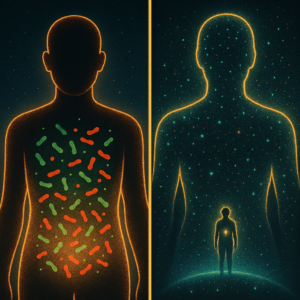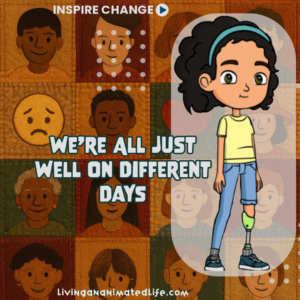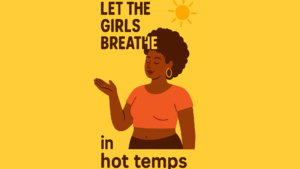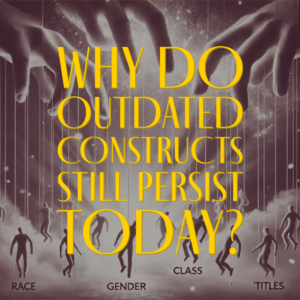We’ve all heard the saying, “You can’t teach an old dog new tricks.” 🐾 It’s often used to express that it’s difficult for people to change, especially as they get older or more set in their ways. But what if I told you that it’s not about learning new tricks but unlearning old ones? 🔄 The real challenge isn’t always about picking up something new but rather about letting go of what no longer serves us—or, more accurately, what we think is still serving us.
Unlearning is just as essential as learning 📚, yet it’s often much harder. Whether it’s an outdated belief, an old habit, or a mindset that no longer aligns with who you want to become, unlearning is the first step toward growth 🌱. But, like the old dog trying to learn a new trick 🐕🎩, it’s tough to break free from what’s familiar. In some ways, those old habits did work at one point. That’s how they became habits in the first place. However, over-usage of anything—good or bad—will wear out both the user and the habit itself ⚙️💡.
Why What Used to Work No Longer Does 🔄
Why does unlearning feel so hard, even when what we hold onto no longer serves us? It’s not just about willpower 💪—the chemistry of change 🔬. As we age and grow, our physical 🧘♂️, mental 💭, and spiritual processes evolve 🧘♀️. Our bodies and minds don’t function the same way they did years ago, and what brought us comfort or success in the past may stop working because our internal chemistry shifts. What worked in your 20s may no longer fit in your 40s or 50s 📅. Plus, your environment 🌍 and life circumstances also change, affecting how you process the world around you.
As we gain new knowledge 📖, experiences 🗺️, and tools 🛠️, we don’t need to rely on outdated methods. But the most critical element is the desire to change. 🌟 No new habit or unlearning can take root without a deep willingness and determination 💡.
The Wake-Up Call: Tap, Push, or Big Thump? 🚨
For many, the path to change can feel like waiting for a wake-up call 📞. Some believe it takes a major life event—an act of God, a crisis, or a transformative moment to force us to change ⚡. People often say life first gives you a tap on the shoulder ☝️, then a push, and if you ignore those, you get the big thump—the crisis that shakes your foundation 🏛️.
Yes, a crisis can be a powerful catalyst for change. But here’s the thing: you don’t have to wait for the big thump 🚨. You don’t need a life-altering moment to start unlearning what no longer serves you. The key is desire and willingness 🧠🧡.
If you have the desire to change and the willingness to put the right tools in place—like mindfulness 🧘♀️, accountability 🤝, and boundaries 🚧 between your old habits and new goals—you can make a change at any point in life.
Tangible and Intangible Examples of Unlearning ⚙️💭
Tangible Examples:
- Exercise🏋️♀️ Regular exercise is great for your health, but overexercising can lead to injuries, exhaustion, and long-term damage. As your body ages, what worked in the past may need to be modified to avoid burnout 🚴♀️🛑.
- Work💼 Being dedicated to your job is positive, but overworking can lead to chronic stress. Learning to balance work and life becomes crucial, and unlearning the constant hustle is part of that process ⚖️.
Intangible Examples:
- Perfectionism 🎯 – Striving for perfection might have driven you to succeed in the past, but as your understanding of success evolves, perfectionism can lead to stress. Unlearning perfection helps you align with a more balanced life ☯️.
- People-Pleasing 😊 – Being kind is great, but constantly putting others first can drain you. Unlearning people-pleasing allows you to prioritize your well-being while maintaining healthy relationships 🤝.
Mindfulness and Willingness: Recognizing When the Old No Longer Fits 🧘♂️🔍
Mindfulness creates a pause—a space to reflect 🌿. It helps us realize when we’re holding onto habits that no longer serve us. As our chemistry changes, mindfulness helps us see how outdated beliefs or behaviors may no longer fit. But without the willingness to change, even the most mindful observations fall flat 💭.
For example, as you age, you may realize that overworking or pushing yourself physically isn’t energizing but wearing you down 😓. Mindfulness creates the space to ask: “Is this habit still serving me?” The willingness to act on that awareness moves you forward 🚶♀️.
Accountability and Support: Breaking the Cycle 🤝💬
Breaking free from harmful habits requires more than self-awareness—it requires accountability 💡. Sometimes, we need others to help us see when we’re relying on outdated beliefs. A trusted friend, mentor, or community can call you out and help you grow 🚀.
As you evolve, so should your support system 🌟. Surround yourself with people who reflect your new tools, celebrate your progress, and gently guide you when you start slipping into old patterns 🧑🤝🧑.
Practical Steps to Unlearn with Desire and Support 🚶♀️✨
- Awareness 🧘♀️ – Begin by using mindfulness to observe your thoughts, habits, and reactions. Ask yourself: “Is this habit still serving me, or have I outgrown it?”
- Reflection ✍️ – Set aside time to meditate or journal about your habits. Reflect on how they served you and if they’re still benefiting your current self 🧐. Tap into your desire for change.
- Action 🎯 – Take baby reverse steps—small, manageable changes that align with your needs today. Whether it’s adjusting your routine or creating balance, these actions will help you move forward.
- Accountability 🤝 – Share your unlearning journey with someone who can help you stay on track.
- Consistency 📅 – Make mindfulness and accountability a daily practice. Keep showing up for yourself, and over time, you’ll let go of habits that no longer serve you.
Conclusion 🌟
Unlearning is tough, especially when the habits or beliefs once served a purpose 🛠️. It’s like teaching an old dog new tricks—it’s not impossible 🐕✨, but it requires patience, mindfulness, and support. You don’t need to wait for a crisis or a “big thump.” If you have the desire and willingness to change and the right tools, you can shift at any point in life 🌱.
Take small steps 🚶♂️, surround yourself with support 🧑🤝🧑, and embrace growth—even if it means saying “no” to things that once brought you comfort. 🌟








